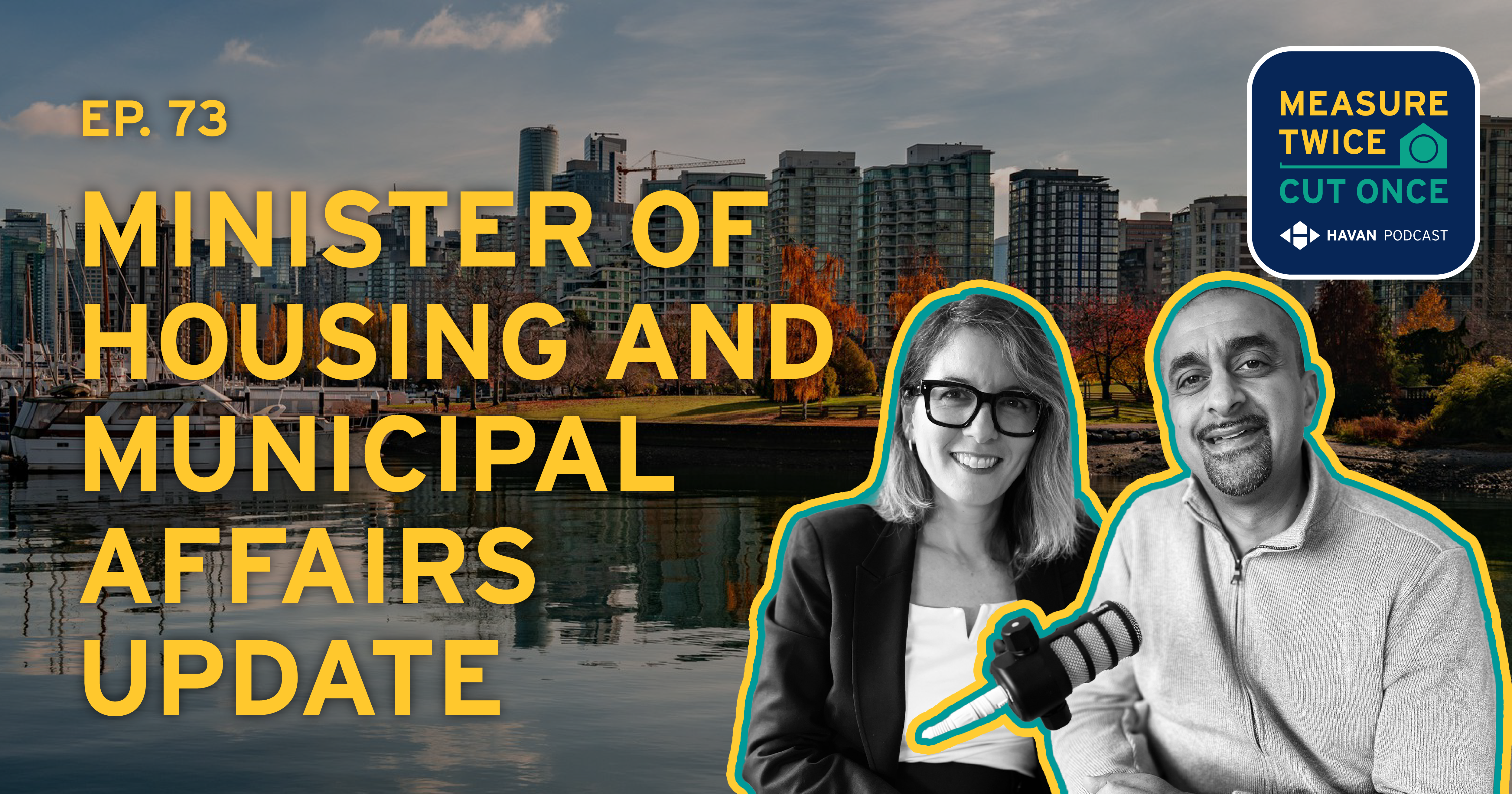Tune in as Wendy McNeil, Acting CEO catches up with newly re-elected Minister of Housing and Municipal Affairs, Ravi Kahlon. Minister Kahlon provides a market update on the NDPs housing initiatives and his take on advancing housing solutions across British Columbia in the face of increasing DCCs and current market challenges.
Listen to “MTCO Ep 73 Market Update with Minister of Housing and Municipal Affairs Ravi Kahlon” on Spreaker.
Podcast Partners
Check out FortisBC to learn about their latest rebates and information on renewable energy options.
BC Housing: We’re working with partners across industry to increase the supply of safe quality, accessible and affordable homes. The Secondary Suite Incentive Program will help provide new homes at affordable rental rates for British Columbians. Learn More – www.bchousing.org
Trail Appliances makes everyday life better. With the best selection in Western Canada, hassle-free delivery, and a price match guarantee, you’ll always get the best deal. At Trail Appliances, you’ll love buying an appliance as much as you’ll love using it.
Co-Host, podcast editor: Jennifer-Lee Gunson: jPod Creations
Co-Host, Mike Freedman, AI Technology & Design
Production: Rami Films
Distributed by Black Press Media: Today in BC.
About the Speaker
Ravi Kahlon, Minister of Housing and Municipal Affairs
Ravi Kahlon was elected as the MLA for Delta North in 2017, 2020 and re-elected in 2024. Ravi Kahlon is the Minister of Housing and Municipal Affairs, and previously served as the Minister of Housing, Minister of Jobs, Economic Recovery and Innovation and as the Parliamentary Secretary for Sport and Multiculturalism.
Born and raised in Victoria, Ravi was introduced to field hockey by his father and grandfather. He is a two time Olympian in the sport for Team Canada and has been inducted into the Delta Sports Hall of Fame.
Prior to his election as an MLA, Ravi spent seven years in banking, and another six years working with the New Democrat Caucus as Director of Stakeholder Relations.
Ravi has been active in the North Delta community for many years as a volunteer on the boards of the Delta Parks and Recreation Committee and Men’s High Performance Field Hockey BC.

Listen and like for your chance to win a gas BBQ compliments of our Podcast Partner FortisBC.
Check out photos of the project!
Here's the Full Transcript of this Episode
MTCO – Ep 73 Minister of Housing and Municipal Affairs – Ravi Kahlon
Wendy McNeil
0:00
Welcome to HAVAN’s podcast, Measure Twice, Cut Once. I’m Wendy McNeil, Acting CEO of HAVAN, and it’s my pleasure to be hosting this special series to celebrate HAVAN’s 50th anniversary. These episodes spotlight thought leaders and key stakeholders in the housing industry, fostering open and transparent dialogue to address the critical challenges of solving the housing crisis. I’m honoured today to welcome today’s guest, the Honourable Ravi Kahlon, Minister of Housing and Municipal Affairs.
- Wendy McNeil
0:30
Minister Kahlon was first elected as MLA for North Delta in May 2017 and under Premier David Eby, he became BC’s Minister of Housing in 2020 and was recently reappointed as Minister of Housing and Municipal Affairs. Previously he served as Minister of Jobs, Economic Recovery and Innovation as well as several Parliamentary Secretary roles. So, Minister Kahlon, thank you so much for joining us today.
- Ravi Kahlon
0:53
Thank you so much for having me. It’s nice to be in the studio.
- Wendy McNeil
0:55
Yeah, it’s been great to have you here. So, I guess we can dive in a little bit here. As you know, HAVAN represents the industry that’s responsible for building 65% of the homes in Metro Vancouver. And if you didn’t know, this podcast also reaches 13,000 homeowners and other industry folks across Metro Vancouver.
So, we’re really excited to have you share your thoughts. As you know, housing is a pressing issue for all British Columbians. And I know our audience is eager to hear your insights. So, let’s dive in. So new role, new agenda. So Premier David Eby has shown great confidence in your leadership as Housing Minister by reappointing you and also expanding your role into Minister of Housing and Municipal Affairs. To help our listeners better understand your new portfolio, could you elaborate on how the municipal affairs component, which includes oversight of funding models, bylaws, zoning, infrastructure and transportation fits into your expanded role?
- Ravi Kahlon
1:47
Yeah, no, I’m very excited first off to be back in this role and chatting with you. I think this is an important not only podcast but an important place for I think some difficult conversations to happen. The exciting thing for me in this role is that when I came into the Ministry of Housing and we were trying to make some pretty big reforms, often I’d hear, okay, but infrastructure, but infrastructure. And so now having the ability to have the but infrastructure part of housing, I think is an important compilation. Somebody was joking with me, they said, now you’ve got the stick and the carrot. And you know, I would say maybe not in those terms but yes now we’re able to do not only the changes we want to see from local governments but we’re also now able to support them because in the end of the day we want vibrant healthy communities, we want housing, but we also want you know the park space, we want to make sure that when the top goes on and goes off it works properly. And so, for us to be able to now plan in that way I think will lead to better outcomes.
- Wendy McNeil
2:51
That’s a great point. I think that we’ve been hearing a lot about the challenges in helping foster development and part of that issue is infrastructure and the costing and all the other challenges associated with that. So, it’s good to hear that the ministry has been combined to be able to kind of hopefully streamline some of the solutions that way.
- Ravi Kahlon
3:10
Yeah, and you know, a lot of the things that we did in the Ministry of Housing, it’s not complete yet. We started the process and we’re still in that implementation phase and we’ll be in some cases, the implementation is going to come real soon, it’s kind of already just happened and in some cases, it’s going to require more pushing and changes in the next year or two years. So, I think the exciting part for me is that I feel like I’ve been in the seat to start the process and now I’m hoping I’m able to see it come all the way across the line.
- Wendy McNeil
3:40
It’s exciting because you have now the first four years to get things kind of organized and understanding and have deep consultation with industry and municipalities and then you can now use the next four years too to kind of continue that service when a lot of times you only get the four years in that sense. So that’s really great.
- Ravi Kahlon
3:56
Yeah, and you know like a lot of the policy changes we made, for example, the small-scale multi-unit legislation that we passed, local governments are only now just changing their bylaws and some of them haven’t quite done it the way we want them to do. And so, we’re able now to see things like that across the line. But yeah, I’m excited. I’m excited about the role.
I’ve been reaching out to a lot of the mayors and community leaders to say, I’m still here, whether they’re happy or not. And I think, you know, my hope is that we get to a place where we all understand that we’re in it together. And the only way we’re going to address the challenges is by working together. It doesn’t mean we’re always going to agree. It’s okay not to always agree. It’s okay to have different opinions. But as long as we all understand where we’re trying to take the ship to, I think we’ll get to good outcomes.
- Wendy McNeil
4:44
Yeah, that’s totally agree with that. That’s great. So why don’t we look kind of talking a little bit about that, doing a bit of a look back again, you know, talk about the suite of housing legislation that was brought in 2023. So, Bill 44 which you just referred to as a small-scale multi-unit housing, Bill 46 the development financing tools and Bill 47 the transit-oriented areas. So, among these initiatives what became known as the naughty list which identified the first 10 municipalities required to meet specific housing targets and recently the annual reports for those 10 were filed and noticed that only three of the 10 were able to meet those targets which includes Delta, the District of North Van and Victoria. So, could you maybe first before we kind of dive into a bit more questions about that, can you refresh our listeners understanding of these initiatives and the objectives?
5:33
- Ravi Kahlon
5:37
Yeah, I would say that we started with the premise that the housing system as it is now not working. It’s not working for those that are trying to build the homes. It’s not working for those that are desperately looking for homes.
- Ravi Kahlon
5:51
And it’s working maybe for those who don’t want to see more homes. And we’re at a place in society where there’s a lot of young people who are thinking about leaving the province because they can’t afford it here.
- Ravi Kahlon
6:02
And you know I’m worried, I’m worried about brain drain, I’m worried about that cycle, that opportunity for people to move up the chain from rent to you know to maybe own a home, that’s broken, it’s not there anymore. And so really what we try to do is to say let’s not try to tinker, let’s try to make it into a system that we think should be the one. And so, the changes that we brought in, just for your listeners if they are not aware of them, is really re-looking at the system and trying to put more certainty in the system.
So now all communities have to use the Housing Needs Report model the same way. They have to assess what they need in their communities using the same template. Before communities were essentially putting in things that they wanted and leaving out things that they didn’t. And so, we couldn’t compare apples to apples when we’re looking to see which community is doing well, which one is not. Now having a standardized allows us to see what every community is doing comparatively.
They have to now take that and update their OCPs by the end of next year. What that means is every community now will be aligned. Some communities have not updated their OCPs like 15 years or longer. And so now they are required to do that. The next step is we are removing public hearings for any project that fits within the community plan.
And so all three pieces work together because now communities engage with their citizens, they identify where the housing is needed, and they make a plan. And then when a project comes forward and it fits within that plan, it doesn’t need to go to public hearing, it doesn’t need to go through an extensive process because we already did that, right? We already engaged with the community. The idea that you have to engage with the community, make a plan and then engage with them again when you have something that fits in the plan just is bonkers, makes no sense. And so those are some of the kind of the big changes. And of course, we’ve said the local governments that single family lots should be allowed to have up to four units. Near transit, it’s obviously much higher, and local governments are making those changes. Now, in order to make sure that work is happening, we created essentially target lists. And I never called them naughty lists, just so you know. It was some reporters that named it that, and now it’s stuck, but I certainly don’t see it that way. I see it more as an alignment of all levels of government. Because the federal government would come to us and say, we need more housing. And then we would say, well, we need this much housing and local governments would have a different number. And the idea was, how can you address a problem if you don’t all agree on what the number is?
And so now the targets are in place. All local governments understand their targets. We are just getting the reports back. We are going to assess the reports to see where communities are at. I would say there’s probably three categories. There’s communities that are doing well, they’re on track.
- Ravi Kahlon
8:52
There are communities that are not on track but are making some changes, making some progress and there’s likely some communities that have no hope and maybe have no interest. And so, we’ll really be looking at those and once the assessment is done, I expect that to be done in the next couple of weeks, then we’re going to have some tough conversations because it’s not fair to the communities that are making the tough decisions that a few are saying we don’t want to participate Because that is the number one reason that I hear against housing in communities people say well Why do we always have to accept the housing? Why do we have to accept the changes in our community? Why isn’t community so-and-so doing their part and in when you’re in a housing crisis? That’s not acceptable So I look forward to seeing the reports from staff and it’s going to require some really difficult conversations with some communities, but I think necessary ones if we want to address the housing crisis in a serious way.
- Wendy McNeil
9:47
I agree. You have a tough job ahead of you, I think, for sure. And part of that is the response or the achievement of their objectives. A lot of municipalities have said that there are a lot of things out of their control that dictate how many houses that we’re able to build, such as high interest rates, inflation, labor shortages, DCCs, community amenity charges, and a lot of things that are kind of out of control. So, what do you think in moving forward and helping these municipalities achieve these targets? Like, are you going to look at more of the carrot and the stick or like, what’s your thoughts on helping encourage and encourage them to continue moving forward to their targets, but understanding that they have been citing some things out of their control?
- Ravi Kahlon
10:33
Well, I do hear from mayors and counselors who say, and CEOs who say, well, you’ve given us targets, but we can’t control if they’re going to get built or not. And to a certain point, I agree. There are market conditions beyond us, even as governments, all levels of governments. There are some decisions that the people in the private sector and not-for-profits make that we can’t control. But it’s not entirely correct to say that we have no influence in that. If a local community raises the DCCs by 150%, you block that housing from being built. I have some local governments who say, look, we’re approving housing, look we just passed your rules and we don’t get but when people actually go to build they have to sit in a waiting line for two years, then they have to negotiate CACs and then they have to deal with the fees going up and then they have to deal with staff who want 15 changes and not all once but gradually. So, what I say to local governments is yes you don’t have a hundred percent control, but you do have enough where you have some responsibility. And so we are still going to hold local governments accountable, but we also will have some grace because if you’re doing all the right things and housing is not going to build, of course we’re not going to be coming down on you heavy, but we want to make sure that local governments are doing everything they can in their power to make sure that the housing can be built. So, it’s a it’s a fine line, we have to find that line because it’s easier for everyone to say it’s somebody else’s problem. It’s easy for the home building community to say it’s all local governments. It’s their fault. It’s easy for them to say it’s not. And so, where do we find that space where it’s all of our responsibility and no one’s fault? And so that’s what we’re trying to find here. Yeah, I think that makes sense.
- Wendy McNeil
12:17
It’s supposed to be, it should be a collaborative process so that everybody’s here for the same reasons, to build more housing and increase affordability. So, if they work together instead of pointing fingers, that’s the only way it’s going to move forward.
- Ravi Kahlon
12:29
Exactly, yeah.
- Wendy McNeil
12:30
Yeah. Excellent. Let’s go into our next question here talking about the DCCs as you just were just mentioning your last question here. So, in September, the building industry raised serious concerns about Metro Vancouver’s proposed DCC increase, which for those of you who don’t know, are called development cost charges and is set to take effect on January 1st, 2025 and in that report, it highlighted over 10,000 homes that were kind of sidelined for now because they were not able to be – they were not viable to move forward due to financial pressures, court order sales, receiverships, but we know that the situation actually probably is more severe than that. Just Surrey alone has reported 44,000 stalled homes, Coquitlam 15,000, Vancouver another 15,000 and really if you look at all municipalities, maybe a conservative estimate could be around 100,000, which is a significant number of housing that families or other peoples could be moving into. So, what are your thoughts on the proposed DCCs increase? I know it’s complicated, but do you believe these higher rates are necessary or hindering the ability to build homes and how is this going to really impact the home buyers at the end of the day?
- Ravi Kahlon
13:38
Questions on that question.
- Wendy McNeil
13:39
I know, I know. Sorry, I looked at the blackout a little bit.
- Ravi Kahlon
13:41
But let me back up a little bit and just say I am sympathetic to when local governments say we need money for infrastructure. I am sympathetic to it because the truth is even for industry, they need that infrastructure to be built because community can only accept so much housing until they’re at a breaking point as well. And on the flip side, I think Metro Vancouver, with their DCC increases, they made a decision that was trying to recoup a lot of dollars that probably elected officials should have been addressing a long time ago, right? They’re trying to address a problem that nobody wanted to deal with for a long time. It’s like that closet where everything just gets put into and then one day somebody has to open it and actually figure it out. And so, you know, my hat goes off to them for being the responsible ones to say, finally, we have to address it. The question I think for Metro is going to be, does it all have to be all a month? You know, is there a way to do it that can still allow for housing? And so, we’re having difficult conversations right now with Metro. In fact, I’ll be meeting with them for a few times the next few days. I’m going to Ottawa to meet with the federal housing minister as well. We have to find ways to build infrastructure. And I’m not saying industry doesn’t have a responsibility.
Industry has a responsibility as well. But I think we have to find a balance. Because right now, with the fee structures that there are, it’s going to make it really difficult for much housing to be built. And you know, it’s a good debate, because people say, well, you’re putting it all in industry, you’re putting it in because you don’t want to raise property taxes. And there is an element of truth that, right? It’s easier to do it here than elsewhere. And so, part of the answer is us as a province coming in and saying, yeah, we’ll help you build some infrastructure. Part of it’s going to be the federal government coming in to say, yeah, we’ll contribute. And how does that look? What does that relationship look like? Those I think are the tough conversations we have to have in the upcoming weeks and months ahead. And by the way, we’re not the only ones having it, right? This is a conversation that’s happening across North America. You know, I’m meeting executives from Colorado who are having this conversation. Chicago is having the same conversation. Ontario is having this conversation. And we’re further along than Ontario, you know, or you could say they’re further behind. But we have some real issues that we have to navigate. But there’s no simple solution. If there was, that would have been done a long time ago.
- Wendy McNeil
16:09
Yeah, no, you’re right.
- Ravi Kahlon
16:10
And so, we’re going to get to the table and sort it out. And again, I’m starting that this week.
- Wendy McNeil
16:15
That’s, you have a big bill of things to do ahead of you. And it’s interesting, because you talked a little bit about the assist factor, which means kind of spreading over like a larger tax base. And I think in a recent article that we were in with Mayor Woodward from Township and saying that he didn’t want to be able to tax the base just because there’s so much burden on them. So, but again, like you said, it’s a lot of negotiation, a lot of discussion on how best can we make sure this stuff happens because without infrastructure, you can’t build homes, you can’t build communities and then we’re all in trouble.
- Ravi Kahlon
16:50
Yeah, and the mayor of Township is probably raised the DCC’s one of the highest in the, in the, certainly in the Metro Vancouver, I would say probably in the province. And he would argue he needs it. But again, it goes to the point where the flip side is to say, well, we’ve proved all this housing, but the fees went up so much that nobody can build. It’s a challenge. And so, I’m also sympathetic to his need for infrastructure for his community. But these are the tough conversations we have to have, right? And that’s why when I say housing targets, you know, it’s both ways. It’s give or take, right? You can’t just say we approve all this housing and then on the flip side say, well, we’re also going to increase fees so much that nobody can build anything. We’ve got to find that balance between the two.
- Wendy McNeil
17:32
Yeah, you’re right. I think it’s a lot to, it’s going to be a lot to navigate and finding a solution will take time, I think, and that’s the key.
- Ravi Kahlon
17:40
Yeah, and time, unfortunately, is something we don’t all have. You have to get going on it real quick, but I do think there’s a path there, but it’s going to require some difficult conversations. Again, I’m looking forward to that.
- Wendy McNeil
17:51
No, that’s great. I think you’ve proven to be really collaborative, so I think that’s a key.
- Ravi Kahlon
17:56
Yeah, I’m hoping that all the players are willing to come to the table and understand that everyone’s going to have to give a little. You know, and that’s always hard, right? Especially when you’ve got folks from industry who got to make their projects pencil, you got local governments who are going to their voters very soon to get another mandate. You know, if we have to find a way that it’s a win-win-win for everybody. And yeah, I think there’s hope. I certainly feel hope. If I didn’t feel hope, I’d ask for another file, but I’m here.
- Wendy McNeil
18:33
Yeah, no, it’s good to be optimistic. I think that’s the only way we can make those goals and work forward to that. And so just kind of working on the need for maybe some bold moves because we are such an expensive market and really one of the least affordable in Canada with average prices are looking at 1.79 million and detached homes at 2.0 million, which is incredible. And do you have some ideas and bold moves kind of in your mind to be able to kind of address the housing cost and improve accessibility of homes for British Columbians?
- Ravi Kahlon
19:06
Yeah, I think part of the work we’ve been doing is to try to address that by cutting a lot of red tape around legalizing housing. We are now allowing single egress stair buildings up to six stories. We’ve made some major changes to mass timber. We’ve made a lot of changes to allow for three, four, six plexes to be built in communities. And so that was to get to that core, right? Just to make it easier for people to build, you shouldn’t have to go through a year or two of waiting to build a four-plex when you can build a single-family home the same size in a very quick way.
And you know changes around public hearings, it’s all designed to get to that very question because time is money and we’re trying to make sure the process gets done in a more transparent way. Even around cost amenity charges, right? We created a new amenity tool, and the purpose of that tool was to say no more backroom debates about what the CAC will be, no more in closed rooms negotiations. Let’s be transparent. Yes, you need money from entities, put it on your website, put it on the dashboard when people come into the city hall. Everyone should know what the cost is and where it’s going in a transparent way so that at least if you’re going to build a home, you know the cost and it’s not something you have to negotiate because what happens too often is you go in the door, you start the process, you project pencils and then they get you in the room for the CAC discussion and then by the end of it, you’re like, I’ve been held hostage. Either I continue and it might not fly, or I give it up and I’ve lost all the sunk costs already done. And so, we’re trying to address the core issues, I think, around housing. And I think we’ve made some progress. I think we’re going to start seeing in the next year, in the next two years, the real
- Wendy McNeil
20:59
fruits of those changes. I think that’s great because I think one of the issues with that, whether it’s CACs or ACCs, is the predictability need so that when you start discussions on a build, especially the larger projects, which could take years before it even reaches anywhere, that it changes midway and we talk a lot about in-stream protections and the need to be able to provide the industry with a predictable pathway and also with cost so that they’re able to make things work because if it doesn’t work, that’s where we are right now as a lot of them are being shelved.
- Ravi Kahlon
21:31
Yeah, we’ve done that with accessibility changes, we did that with the seismic changes, right? We’ve said any project that’s in-stream is protected and it’s not to say we don’t need those things. You know, we need those things. I know it’s a tough thing. People, especially in the home building community, come to say to me, well, do we need that much accessibility? And I always say, well, we have an aging population. And if you’re a person in a wheelchair, it’s not acceptable to say you can get to 10% of the units. You know, like, if you live that life and you are going to visit a family member and they move to a new place, it’s not acceptable to say to them, well, you can actually go visit your family if they live in 10% of the building or 20% of the building, but maybe not if you’re in those other units, you know. And also, you don’t know in life circumstances and if you get all that stuff roughed in, I think it’s important.
And so, you know, these are the debates we have often, but we also have to look at it in a way of making sure that our homes are being built for the population that we have now and the one we are going to have in the coming years.
- Wendy McNeil
22:31
I think that is a good reflection of those changes and we have seen the results of those in-stream protections which I think the industry appreciates to allow them to again deliver those houses that we need so much in this region. So, Minister Callan, thank you so much for taking your time and your insights and providing an update on what’s going on with your ministry initiatives and look forward to the conversation. Thank you for joining us.
- Ravi Kahlon
22:56
Yeah, thanks so much for having me and I look forward to hopefully you invite me back and I’ll be back again.
- Wendy McNeil
23:00
Of course. We want to have an update I think and seeing how things are going, and we love to continue that conversation for sure.
- Ravi Kahlon
23:06
Yeah, and I listen to the podcast, so I look forward to being back.
- Wendy McNeil
23:09
Perfect. Thank you so much. I hope today’s conversation has helped our listeners across BC gain a deeper understanding of the complexities of the housing market and the challenges the industry faces in building the homes we urgently need. These issues affect every one of us and I look forward to continuing this important dialogue. For notes and links to resources mentioned in today’s episode, including those shared by Minister Kahlon, please visit www.havan.ca/measuretwicecutonce we look forward to having you join us at the next episode.


















